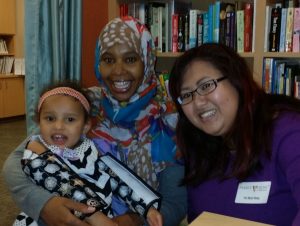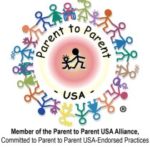 Get Connected: Parent to Parent Peer Support
Get Connected: Parent to Parent Peer Support
Parent to Parent Peer Support is a part of comprehensive care for families whose children have special health care needs and disabilities.
When parents get CONNECTED they receive support such as:
• Connection with another parent who has child with similar needs or circumstances.
• Information from another parent who has received special training.
• Emotional support that provides understanding and acceptance so they do not feel alone.
• Assistance finding services including healthcare, educational, financial, and community living.
• Education, empowerment and encouragement to partner with their child’s providers.
Family Voices of Minnesota study:
 Executive Summary of Family Voices of Minnesota’s Study Data
Executive Summary of Family Voices of Minnesota’s Study Data
 The Importance of Parent to Parent from the Parent’s Perspective
The Importance of Parent to Parent from the Parent’s Perspective
 Family Voices of Minnesota’s Parent to Parent program is the Minnesota member of the Parent to Parent USA Alliance. We are committed to using the Parent to Parent USA endorsed practices for providing parent to parent support and information, based on over 30 years of parent to parent research.
Family Voices of Minnesota’s Parent to Parent program is the Minnesota member of the Parent to Parent USA Alliance. We are committed to using the Parent to Parent USA endorsed practices for providing parent to parent support and information, based on over 30 years of parent to parent research.
The History and Background of Parent to Parent
In a 2009 survey Minnesota families of children and youth with special health care needs and disabilities (CYSHCN) reported challenges finding information about their child’s conditions, services and treatments, and information about specialists. In this same survey, families clearly indicated that connecting with another parent is critical to knowing where to look for resources and services for their children and youth. (Leite, 2010).
In response to this survey and requests from families and healthcare organizations Family Voices of Minnesota established a state-wide Parent to Parent program for families of CYSHCN. In September 2011 Family Voices of Minnesota was awarded a Federal Maternal Child Health Bureau Grant to build parent to parent support and information as a best practice in primary care practices across Minnesota.
The third edition of Bright Futures: Guidelines for Health Supervision of Infants, Children, and Adolescents by the American Academy of Pediatrics provides guidance to health care providers about the role of primary care in promoting family support and states that, “Helping families identify natural support networks and community resources is essential. Peer and community networks can provide support not only for medical concerns but also logistical and emotional issues.” Bright Futures goes on to specifically mention Parent to Parent and Family Voices programs as recommended referral sources. Yet many health care providers are unaware that peer support is a recommended best practice by the American Academy of Pediatrics and Bright Futures and is one of the elements of family-centered care.
The Bright Futures recommendations came from 30 years of research about the outcomes related to parent to parent support and information for families of CYSHCN. These studies suggest that parent to parent programs following the Parent to Parent USA best practice guidelines are an effective way to support parents of CYSHCN and have an important place as part of a comprehensive system of care. This research shows that perceived sameness of lived experience is a fundamental reason why parents trust other parents (Ainbinder et al, 1998).
Family Voices of Minnesota’s Parent to Parent Program follows the recommended best practices of Parent to Parent USA because the research indicates that parent run organizations providing structured training and follow-up using these recommended best practices are successful in preparing experienced parents as volunteer mentors or support parents (Singer et al, 1999). After receiving emotional and informational support, parents have shown increased confidence in parenting their children with special needs (Singer et al). Increases in self-efficacy, in turn, are associated with a variety of improvements in health care utilization and participation at all levels of planning from individual medical planning for a child, to organizational planning for a clinic (Wagner, Austin, & Von Korff, 1996).
The support both given and received by another parent has been termed “the cradle of leadership”, because it is often through this relationship that parents discover within themselves their voice for advocacy. Confident, knowledgeable parents are better able to partner with providers and increase their skills to become involved in helping to improve systems of care.
